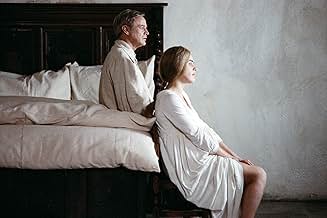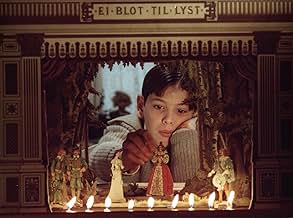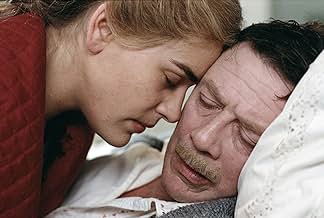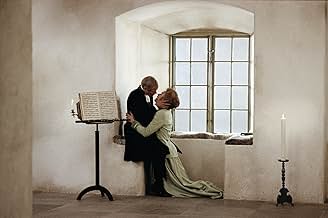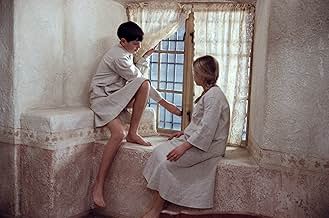Deux jeunes enfants suédois vivent les nombreuses comédies et tragédies de leur famille, les Ekdhal.Deux jeunes enfants suédois vivent les nombreuses comédies et tragédies de leur famille, les Ekdhal.Deux jeunes enfants suédois vivent les nombreuses comédies et tragédies de leur famille, les Ekdhal.
- Récompensé par 4 Oscars
- 25 victoires et 12 nominations au total
Patricia Gélin
- Staty - Ekdahlska huset
- (as Patricia Gelin)
Top-Rated Christmas Movies to Stream This Season
Top-Rated Christmas Movies to Stream This Season
See the very best Christmas movies streaming this season, according to IMDb fan ratings.
Histoire
Le saviez-vous
- AnecdotesAt the time, the largest film production ever in Sweden (with 60 speaking parts and over 1200 extras) and the most expensive, with a budget of $6 million.
- GaffesAmong the Christmas decorations in the Ekdahl house, there is a garland of miniature flags of the Nordic countries, including the Finnish flag. The Finnish flag was in fact only designed and adopted after Finnish independence in 1917, a decade after the events of the film.
- Citations
Ekdahlska huset - Helena Ekdahl: Are you sad because you've grown old?
Jacobis hus - Isak Jacobi: I'm certainly not. Everything's getting worse. Worse people, worse machines, worse wars... and worse weather. I'm glad I'll soon be dead.
- Versions alternativesTheatrical version is 188 minutes long. The TV mini-series version is 312 minutes long.
- ConnexionsEdited into Fanny et Alexandre (1983)
Commentaire à la une
Perhaps the most impressive feature of this wonderful film is the humility with which its creator presents it to the world, as if it were no grander than the old-fashioned Nativity-play shown in the early scenes at the Theatre.
At the end of this experience - to term it with any mere technical tag, like 'movie', would be inadequate - Bergman's profoundly grown-up disillusionment has transformed into the pure spirituality of abnegation and acceptance. His intellectual pilgrimage, through possibly the greatest career in films, finds the director arriving back where he began, with the great simplicities of life. But there is a difference with his return, which is that his prodigality over the years has burnt the rage out of him, and finally allowed him to 'enjoy what may be enjoyed' (as one of the Ekdahls says), without further fretting over the puzzle of human existence. From all this human folly (he clearly feels) comes the only wisdom, which is - simply - to be human.
It is, indeed, a film like no other for allowing the pieces of experience to settle into their appointed places. There is a beautiful quality of selfless resignation, in this last of his works for cinema, which finally and forever excels the sadistic disciplines of The Bishop.
This perverted creature confesses, to the new wife whom he has lost, how it is impossible to 'tear off the mask' as it is 'burned into my face': He is become an authoritarian '... a rite, a law, a custom - not a man'. [Shelley] Having put the notional love of God before that of humankind, there is nowhere for his personality to be re-enacted in the bosom of any kindly recollections that will survive him. Except in that of Alexander/Bergman, where his two, each-in-their-own-way terrifying, fathers, both the White and the Black opposites of an imagination flickering with the director's haunted vision, will project forever onto his Cinematic arena of stark absolutes the inner strife where each of us is locked away, struggling to endure the turmoil of these eternally irreconcilable truths.
The White Knight and The Black Bishop: These are phantom moves in our great game with Death, and pieces that will be returned into play for as long as humanity continues. How like Chess Life is: Just a game we play, with arbitrary rules, and yet whose progress is of supreme and abiding concern to each and every one of us.
This great work is a monument to play, in all its senses, not least the play of light and the play of ideas, both equally insubstantial and yet the essence of reality, eloquent as the silence of a great, roofless Cathedral. Out of the Ruin of Faith, Bergman has wrought a Peace that passeth understanding. And it is in this ultimate by-passing of the relentless structures of intellect that Bergman finally achieves the resolution of his productive neuroses, in a truly magical film whose every phase is as inevitable as breathing, or the changeable and unimpeded weather.
As the grandmother reflects. at last, 'I don't want to put Life together anymore. I just leave it broken. Strangely, it seems better that way.'
Death, in the end, is not a calamity, but the choice of all who have truly known Life. In other words, to choose Life is to accept its Dark partner, Death. And to accept each as part of the family group, even though they seem complete misfits there.
The old lady, with Strindberg's Dream-play in her lap, knows at last that the whole history of her family is only a personal reverie. And yet how much more real it seems than her son Carl's immature and somewhat absurd, angst-ridden railings against 'cruel Fate'!
Had he only accepted his patient wife's gently sympathetic injunction to 'Never mind' the Professor would have been both wiser and happier, enduring with patient fortitude the oceanic inconsequentialities of life's real Mystery, and attending far less to the trivial pseudo-mysteries of his solipsistic men's club. All his morbid rationalising is precisely as much use in real life as the usual state of alcoholic befuddlement which is the only serious pursuit of this club.
Reason as befuddlement; The sleep of reason as deliverance. With saint-like humility, Bergman gives us back our ordinary human life, as he surrenders his exceptional life in films. But he knows that the ghost of this life will always be with us. His anguished worldliness will haunt us - as the Ghost of Hamlet's father must haunt Alexander - forever.
At the end of this experience - to term it with any mere technical tag, like 'movie', would be inadequate - Bergman's profoundly grown-up disillusionment has transformed into the pure spirituality of abnegation and acceptance. His intellectual pilgrimage, through possibly the greatest career in films, finds the director arriving back where he began, with the great simplicities of life. But there is a difference with his return, which is that his prodigality over the years has burnt the rage out of him, and finally allowed him to 'enjoy what may be enjoyed' (as one of the Ekdahls says), without further fretting over the puzzle of human existence. From all this human folly (he clearly feels) comes the only wisdom, which is - simply - to be human.
It is, indeed, a film like no other for allowing the pieces of experience to settle into their appointed places. There is a beautiful quality of selfless resignation, in this last of his works for cinema, which finally and forever excels the sadistic disciplines of The Bishop.
This perverted creature confesses, to the new wife whom he has lost, how it is impossible to 'tear off the mask' as it is 'burned into my face': He is become an authoritarian '... a rite, a law, a custom - not a man'. [Shelley] Having put the notional love of God before that of humankind, there is nowhere for his personality to be re-enacted in the bosom of any kindly recollections that will survive him. Except in that of Alexander/Bergman, where his two, each-in-their-own-way terrifying, fathers, both the White and the Black opposites of an imagination flickering with the director's haunted vision, will project forever onto his Cinematic arena of stark absolutes the inner strife where each of us is locked away, struggling to endure the turmoil of these eternally irreconcilable truths.
The White Knight and The Black Bishop: These are phantom moves in our great game with Death, and pieces that will be returned into play for as long as humanity continues. How like Chess Life is: Just a game we play, with arbitrary rules, and yet whose progress is of supreme and abiding concern to each and every one of us.
This great work is a monument to play, in all its senses, not least the play of light and the play of ideas, both equally insubstantial and yet the essence of reality, eloquent as the silence of a great, roofless Cathedral. Out of the Ruin of Faith, Bergman has wrought a Peace that passeth understanding. And it is in this ultimate by-passing of the relentless structures of intellect that Bergman finally achieves the resolution of his productive neuroses, in a truly magical film whose every phase is as inevitable as breathing, or the changeable and unimpeded weather.
As the grandmother reflects. at last, 'I don't want to put Life together anymore. I just leave it broken. Strangely, it seems better that way.'
Death, in the end, is not a calamity, but the choice of all who have truly known Life. In other words, to choose Life is to accept its Dark partner, Death. And to accept each as part of the family group, even though they seem complete misfits there.
The old lady, with Strindberg's Dream-play in her lap, knows at last that the whole history of her family is only a personal reverie. And yet how much more real it seems than her son Carl's immature and somewhat absurd, angst-ridden railings against 'cruel Fate'!
Had he only accepted his patient wife's gently sympathetic injunction to 'Never mind' the Professor would have been both wiser and happier, enduring with patient fortitude the oceanic inconsequentialities of life's real Mystery, and attending far less to the trivial pseudo-mysteries of his solipsistic men's club. All his morbid rationalising is precisely as much use in real life as the usual state of alcoholic befuddlement which is the only serious pursuit of this club.
Reason as befuddlement; The sleep of reason as deliverance. With saint-like humility, Bergman gives us back our ordinary human life, as he surrenders his exceptional life in films. But he knows that the ghost of this life will always be with us. His anguished worldliness will haunt us - as the Ghost of Hamlet's father must haunt Alexander - forever.
- philipdavies
- 7 mai 2003
- Permalien
Meilleurs choix
Connectez-vous pour évaluer et suivre la liste de favoris afin de recevoir des recommandations personnalisées
Détails
- Date de sortie
- Pays d’origine
- Langues
- Aussi connu sous le nom de
- Fanny and Alexander
- Lieux de tournage
- Sociétés de production
- Voir plus de crédits d'entreprise sur IMDbPro
Box-office
- Budget
- 6 000 000 $US (estimé)
- Montant brut aux États-Unis et au Canada
- 6 783 304 $US
- Montant brut mondial
- 6 813 882 $US
- Durée3 heures 8 minutes
- Mixage
- Rapport de forme
- 1.66 : 1
Contribuer à cette page
Suggérer une modification ou ajouter du contenu manquant



